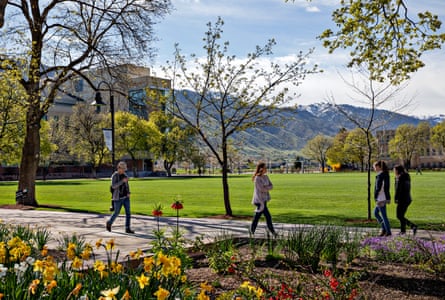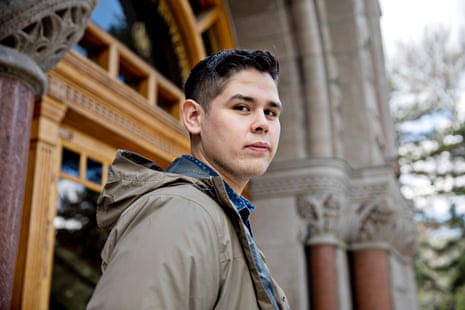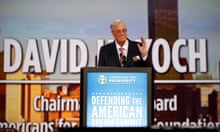At first, Angel Lopez felt honored to have won the scholarship.
In 2017, the marketing student at Utah State University’s business school was named a Koch Scholar, a program sponsored by Charles Koch, the ultra-conservative billionaire. Fifteen students are given a $1,000 stipend and selected to participate in the “reading group”, tasked with reading one book a week.
But Lopez, 23, the son of Latino immigrants who aspired to become a social worker, soon felt the program was promoting a hardline brand of rightwing politics. His required readings, with titles such as Order Without Law and Anarchy Unbound, could often be boiled down to a single idea: Government is bad.
Critics say the Koch Scholars program is one example of how Charles Koch has sought to transform the Utah State business school into a libertarian mouthpiece. Over the last 10 years Koch has given millions to the university, including a $25m gift in 2017 that led to the creation of a thinktank: the Center for Growth and Opportunity.
He is pursuing similar policies at schools nationwide, in what Koch officials themselves describe as a concerted effort to influence the next generation of political and business minds. “Our funding helps [scholars] follow their research wherever it may lead,” the foundation says in public materials. “We are committed to the highest standards of philanthropy.”

We are student journalists at Utah State, and for the past year we have been investigating the Koch donations for the Guardian and our student newspaper, the Utah Statesman. We have interviewed more than 20 of our fellow students and staff, and pulled dozens of public records. What we found paints a picture of how Charles Koch is using his wealth to affect the education of 3,500 students at the business school.
Many public universities depend heavily on private donations, and benefactors of all political stripes, such as Michael Bloomberg and George Soros, donate to universities across the country. But, for Charles Koch, universities are a relatively recent investment – and are part of a grander plan to shift America to the right.
At a 2014 seminar titled Leveraging Science and the Universities, Brian Hooks, president of the Charles Koch foundation, told the audience: “Universities can have a major influence on the national conversation, but it doesn’t happen by accident. Our job is to make sure that we’ve got a strategy for our work to have a disproportionate impact.”
Koch has successfully built educational empires with donations to schools such as George Mason University and Florida State University. At George Mason, where the Koch foundation has donated $95.5m, foundation members have sat on hiring committees tasked with finding professors and were able to suggest students for admission. At Florida State, the Koch foundation donated $1.5m in exchange for the university hiring two faculty members with Koch-approved agendas.
But at USU, spokesman Tim Vitale said there are efforts to prevent undue influence over professors and student admissions. “That is not the case here. We made sure that those mechanisms and oversight controls are clear and in place.”

‘Academic freedom’
Utah State is idyllic in many ways: nestled in the Rocky Mountains north of Salt Lake City, the school is well known for its agriculture, education and space research programs.
The Koch effort here began in 2008, when the Charles Koch foundation agreed to provide USU with money for professors: $25,000 every year for one “Koch professor” and the same stipend for each of four “faculty junior professors”.
Although the agreement mentioned “academic freedom” as a requirement for the donation, the agreement also required USU to involve the Koch foundation in reviewing candidates for the professorships.
Randy Simmons, a researcher who has long been deeply involved with Koch-related organizations, was named as the Koch professor. Simmons has published several reports attacking renewable energy, in addition to his anti-government book Beyond the Roots of Politics: Government Failure. One of his op-eds, in Newsweek, denouncing wind power and suggesting states should not support it, received national attention after Newsweek failed to disclose Simmons’ ties to the Kochs. Simmons declined to comment for this story, though he has been a prominent public voice.
But it was the Koch donation of $25m in 2017 that supercharged their influence on campus.
Based on public documents and interviews with those involved, the university used the money to hire 13 of 19 staff members from a prominent libertarian thinktank that was previously independent of the university, Strata Policy, and place them at the university’s new think tank, the Center for Growth and Opportunity (CGO). Strata has backed conservative positions on issues such as fossil fuel dependence, public land management and signed a letter in support of Donald Trump’s controversial downsizing of national monuments.

Even though the CGO’s physical building is on university grounds, it shares a legal address with Strata Policy, about two miles from campus, according to tax filings and employee pay stubs.
Its leadership has strong Koch ties. And Randy Simmons, who had been named the Koch professor, became the center’s outreach director.
Since then, faculty at USU have voted to convene a task force to monitor the donation and evaluate its effects on academic freedom.
“From what I have seen, the CGO is falling right in line with what you would expect from a Koch-funded center,” said Arthur Caplan, a professor of environmental economics at USU.
A School of Business professor, who requested anonymity due to fear of retribution from university administrators, said the center’s purpose is to “persuade these policy makers about public lands, anti-green energy and such”, the professor said. “It’s not academically sound research, what we look for in a business school.”

The professor cited articles such as “Reexamining presidential power over national monuments”, published by CGO research director Megan Hansen in The Hill newspaper in 2018. The piece praised a Republican senator for his efforts to prevent future presidents designating national monuments in Utah.
Another example in The Hill, by Josh Smith, CGO’s research manager, criticized an incentive for people who install solar panels.
USU spokesman Vitale said Center for Growth and Opportunity and Strata Policy have no connections to each other, and Strata has never been associated with the university. Randy Simmons declined to comment for this story.
“We are completely independent of our funders in how we select the research we do,” said Parker Jeppesen, communications director at the CGO. “Our donors are completely walled off from the research process.”
‘A libertarian experience’
Some Koch Scholars describe their experience as an attempt at indoctrination of libertarian ideals, such as free markets and little-to-no environmental regulation.


According to the Koch Scholar’s website, the group’s purpose is to “meet weekly to discuss classic and contemporary literary works for a few hours over dinner”.
“Definitely a majority libertarian experience,” said Savanna Jones, 21, who attended the business school as an economics major and will attend Georgetown University Law School this fall. “The professors all were pretty much of one mind and the majority of the students attracted to the program were as well.”
Jones says the required reading given to scholars simply used different analogies to “tell the same story” of the failures of government, a pillar of libertarian thinking.
“I just felt like we were going in circles,” she said.
Angel Lopez says he usually remains quiet during discussions and regrets the few instances he spoke up to offer an alternative view of more liberal ideals. “The professors have very strong viewpoints and kind of shut yours down. I had that happen to me maybe once or twice,” Lopez said.
William Shughart, a Utah State University professor and a faculty advisor for the Koch Scholars program, disagrees with this assessment. He said the program works to ensure students are receiving a well-rounded education, encourages “a lively discussion”, and has even put Karl Marx on the syllabus.
“We’ve never done anything to prevent students from expressing their points of view,” Shughart said. “I’m disappointed to hear that, but that’s certainly not our intention.”
Lopez had planned to major in both marketing and economics, but after his experience as a Koch Scholar, he changed his mind. Economics just wasn’t that appealing to him anymore.








